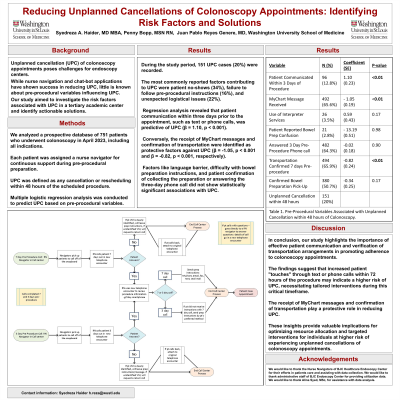Tuesday Poster Session
Category: Colorectal Cancer Prevention
P3174 - Risk Factors for Unplanned Cancellations of Colonoscopy Appointments: A Prospective Study in a Tertiary Academic Center
Tuesday, October 24, 2023
10:30 AM - 4:00 PM PT
Location: Exhibit Hall

Has Audio
- SH
Syedreza A. Haider, MD, MBA
Washington University School of Medicine in St. Louis
St. Louis, MO
Presenting Author(s)
Syedreza A. Haider, MD, MBA1, Penny A. Bopp, MSN, RN2, Juan Reyes Genere, MD2
1Washington University School of Medicine in St. Louis, St. Louis, MO; 2Washington University, St. Louis, MO
Introduction: Unplanned cancellation (UPC) of colonoscopy appointments present significant challenges for endoscopy centers. Nurse navigation and chat-bot applications have been used to mitigate UPC with success, however, little is known regarding pre-procedural care process variables that influence UPC. We sought to investigate risk factors associated with UPC in a tertiary academic center to identify variables with actionable solutions.
Methods: We analyzed a prospective database of 751 patients who underwent colonoscopy in April 2023, including all indications. Each patient was assigned a nurse navigator for continuous support during pre-procedural preparation. UPC was defined as any cancellation or rescheduling within 48 hours of the scheduled procedure. Multiple logistic regression analysis was conducted to predict UPC based on pre-procedural variables.
Results: During the study period, 151 UPC cases (20%) were recorded. The most commonly reported factors contributing to UPC were patient no-shows (34%), failure to follow pre-procedural instructions (16%), and unexpected logistical issues (22%). Regression analysis revealed that patient communication within three days prior to the appointment, such as text or phone calls, was predictive of UPC (β = 1.10, p < 0.001). Conversely, the receipt of MyChart messages and confirmation of transportation were identified as protective factors against UPC (β = -1.05, p < 0.001 and β = -0.82, p < 0.001, respectively). Factors like language barrier, difficulty with bowel preparation instructions, and patient confirmation of collecting the preparation or answering the three-day phone call did not show statistically significant associations with UPC.
Discussion: In conclusion, our study highlights the importance of effective patient communication and verification of transportation arrangements in promoting adherence to colonoscopy appointments. The findings suggest that increased patient "touches" through text or phone calls within 72 hours of the procedure may indicate a higher risk of UPC, necessitating tailored interventions during this critical timeframe. On the other hand, the receipt of MyChart messages and confirmation of transportation play a protective role in reducing UPC. These insights provide valuable implications for optimizing resource allocation and targeted interventions for individuals at higher risk of experiencing unplanned cancellations of colonoscopy appointments.

Disclosures:
Syedreza A. Haider, MD, MBA1, Penny A. Bopp, MSN, RN2, Juan Reyes Genere, MD2. P3174 - Risk Factors for Unplanned Cancellations of Colonoscopy Appointments: A Prospective Study in a Tertiary Academic Center, ACG 2023 Annual Scientific Meeting Abstracts. Vancouver, BC, Canada: American College of Gastroenterology.
1Washington University School of Medicine in St. Louis, St. Louis, MO; 2Washington University, St. Louis, MO
Introduction: Unplanned cancellation (UPC) of colonoscopy appointments present significant challenges for endoscopy centers. Nurse navigation and chat-bot applications have been used to mitigate UPC with success, however, little is known regarding pre-procedural care process variables that influence UPC. We sought to investigate risk factors associated with UPC in a tertiary academic center to identify variables with actionable solutions.
Methods: We analyzed a prospective database of 751 patients who underwent colonoscopy in April 2023, including all indications. Each patient was assigned a nurse navigator for continuous support during pre-procedural preparation. UPC was defined as any cancellation or rescheduling within 48 hours of the scheduled procedure. Multiple logistic regression analysis was conducted to predict UPC based on pre-procedural variables.
Results: During the study period, 151 UPC cases (20%) were recorded. The most commonly reported factors contributing to UPC were patient no-shows (34%), failure to follow pre-procedural instructions (16%), and unexpected logistical issues (22%). Regression analysis revealed that patient communication within three days prior to the appointment, such as text or phone calls, was predictive of UPC (β = 1.10, p < 0.001). Conversely, the receipt of MyChart messages and confirmation of transportation were identified as protective factors against UPC (β = -1.05, p < 0.001 and β = -0.82, p < 0.001, respectively). Factors like language barrier, difficulty with bowel preparation instructions, and patient confirmation of collecting the preparation or answering the three-day phone call did not show statistically significant associations with UPC.
Discussion: In conclusion, our study highlights the importance of effective patient communication and verification of transportation arrangements in promoting adherence to colonoscopy appointments. The findings suggest that increased patient "touches" through text or phone calls within 72 hours of the procedure may indicate a higher risk of UPC, necessitating tailored interventions during this critical timeframe. On the other hand, the receipt of MyChart messages and confirmation of transportation play a protective role in reducing UPC. These insights provide valuable implications for optimizing resource allocation and targeted interventions for individuals at higher risk of experiencing unplanned cancellations of colonoscopy appointments.

Figure: Figure1. Process Flow Chart of Nurse Navigator Phone Calls and Pre-Procedural Inputs For Colonoscopy
Disclosures:
Syedreza Haider indicated no relevant financial relationships.
Penny Bopp indicated no relevant financial relationships.
Juan Reyes Genere: Edulis Inc. – Consultant, Stock-privately held company.
Syedreza A. Haider, MD, MBA1, Penny A. Bopp, MSN, RN2, Juan Reyes Genere, MD2. P3174 - Risk Factors for Unplanned Cancellations of Colonoscopy Appointments: A Prospective Study in a Tertiary Academic Center, ACG 2023 Annual Scientific Meeting Abstracts. Vancouver, BC, Canada: American College of Gastroenterology.
